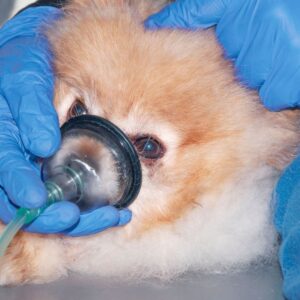Your chosen vet will estimate the frequency of health checkups but a general recommendation guide suggests that a healthy adult dog should have a yearly checkup, and senior and geriatric dogs should have general health checkups twice a year.
Each dog is individual and to answer your question “How often should I take my dog to the vet” I will have to cover and include different life stages, potential issues, and emergencies to help you navigate the vet schedule.
So let’s talk about vet visits.
How Often Should I Take My Dog to the Vet: Table of Contents
How Often Should I Take My Dog to the Vet – Chart
| Dog age | Vet Visit Schedule | Targeted checkups and procedures |
| Puppy | every 3-4 weeks until they are around 16-20 weeks old | First Wellness Exam Vaccinations Deworming and Parasite Prevention |
| Adult | 1/ year (if the dog doesn’t show/has health issues) | Annual Wellness Exams Parasite Prevention Vaccinations Dental Health |
| Senior | 2/ year (if the dog is healthy and doesn’t have health issues) | Comprehensive Physical Examination Dental Examination and Cleaning Bloodwork and Urinalysis Eye and Vision Checkup Joint and Mobility Assessment Nutritional Evaluation Vaccinations and Parasite Prevention |
| Geriatric | 2/ year + (depending on the health status of the geriatric dog) | Comprehensive Physical Examination Dental Examination and Cleaning Bloodwork and Urinalysis Eye and Vision Checkup Joint and Mobility Assessment Nutritional Evaluation Vaccinations and Parasite Prevention Quality of Life Medication Management |
These schedules and recommended checkups are general guidelines for healthy dogs.
If your dog is diagnosed with a specific health issue or you notice behavioral changes, don’t hesitate to take your dog to the vet.
How often should I take my Puppy to the Vet?

The frequency of vet visits for a puppy may vary depending on its age, health status, and specific veterinary recommendations.
Here is a general guideline for puppy vet visits:
First Wellness Exam: This should ideally take place within a few days or weeks after bringing the puppy home.
During this visit, the vet will perform a comprehensive examination, check for any underlying health issues, discuss vaccinations and preventive care, provide advice on nutrition and training, and address any questions or concerns you may have.
Vaccinations: Puppies require a series of vaccinations to protect them against common diseases.
The initial vaccination series typically begins around 6-8 weeks of age and continues every 2-4 weeks until the puppy is around 16-20 weeks old. These vaccinations are crucial for building the puppy’s immunity and protecting it from potentially life-threatening diseases.
Vaccinations include:
- Distemper
- Kennel cough
- Rabies
- Lyme disease
- Influenza
Deworming and Parasite Prevention: Puppies are often susceptible to parasites like intestinal worms and fleas. Regular deworming and preventive treatments for fleas, ticks, and heartworms are essential to ensure the puppy’s well-being. Your vet will provide guidance on the appropriate deworming schedule and recommend suitable preventive products.
Regular Checkups: After the initial wellness exam and completion of the vaccination series, puppies should have regular checkups with the vet, typically, puppies should visit the vet every 3-4 weeks until they are around 16-20 weeks old.
Afterward, they may transition to adult dog care and have annual checkups, although some veterinarians recommend twice-yearly visits for adult dogs as well.
Common Health Issues in Puppies
Puppies are more susceptible to certain illnesses due to their weaker immune systems and natural curiosity.
Here are some of the most common health issues in puppies:
- Parvovirus (Parvo): Parvovirus is a highly contagious and potentially fatal viral infection that affects puppies, particularly those that are not fully vaccinated. It can cause severe gastrointestinal symptoms such as vomiting, diarrhea (often bloody), lethargy, and dehydration.
- Parasites: Puppies are commonly affected by parasites such as fleas, ticks, mites, and worms (including roundworms, hookworms, and whipworms). These parasites can cause a range of health issues, including skin irritation, anemia, gastrointestinal problems, and in severe cases, stunted growth and organ damage.
- Respiratory Infections: Puppies are prone to respiratory infections, including canine influenza, kennel cough (Bordetella), and pneumonia. These infections can cause coughing, sneezing, nasal discharge, fever, and difficulty breathing.
- Digestive Issues: Puppies may experience digestive problems such as diarrhea, constipation, and gastrointestinal upset. These issues can be caused by dietary changes, food intolerances, infections, or dietary indiscretion.
- Skin Problems: Skin conditions like allergies, hot spots, fungal infections, and mange are common in puppies. Symptoms include Itching, redness, hair loss, and skin lesions.
- Congenital Conditions: Some puppies may be born with congenital conditions, such as heart defects, cleft palate, hernias, or skeletal abnormalities. These conditions require medical attention and may necessitate surgical intervention.
How often should I take my Adult dog to the Vet?

The frequency of vet visits for adult dogs depends on age, breed, lifestyle, and overall health.
Here are some general guidelines:
Annual Wellness Exams: It is generally recommended to take your adult dog for a wellness exam once a year. These checkups allow the veterinarian to assess your dog’s overall health, detect any early signs of illness or disease, and provide preventive care.
Vaccinations: Adult dogs should receive core vaccinations, such as rabies, distemper, parvovirus, and adenovirus, as recommended by your veterinarian.
The frequency of vaccinations may vary, but most core vaccines are administered every 1 to 3 years, depending on your location and local regulations.
Parasite Prevention: Regular checkups provide an opportunity for your vet to assess your dog’s parasite prevention needs. This includes protection against fleas, ticks, heartworms, and intestinal parasites.
Your vet may recommend appropriate preventive medications and perform tests to ensure your dog is free from these parasites.
Dental Health: Dental care is crucial for the overall well-being of your dog. During checkups, the vet can examine your dog’s teeth and gums, perform dental cleanings if necessary, and provide advice on home dental care routines.
Common health issues in adult dogs
- Communicable Diseases: Adult dogs can be susceptible to contagious diseases such as canine distemper, parvovirus, and rabies if they haven’t been properly vaccinated.
- Intestinal Parasites: Your veterinarian can diagnose these parasites through a stool sample and provide appropriate treatment and preventive measures.
- Ear Infections: Ear infections are a common health issue in dogs, often caused by allergies, yeast, mites, bacteria, or hair growth in the ear canal. Symptoms may include head shaking, scratching, ear odor, redness, and discharge.
- Skin Issues: Skin problems, lead to itching, scratching, and discomfort. Skin issues can be caused by allergies, infections, parasites, or underlying health conditions.
- Dental Disease: Dental problems, such as periodontal disease and tooth decay, are common in adult dogs. Poor dental hygiene can lead to plaque buildup, tartar, gum disease, and tooth loss. Regular dental care, including brushing their teeth and professional cleanings by a veterinarian, is important to maintain good oral health.
- Arthritis: A degenerative joint disease that causes pain, stiffness, and mobility issues. Large breeds and overweight dogs are particularly prone to this condition.
- Obesity: Obesity is a significant health concern in adult dogs and can lead to various health problems, including diabetes, joint issues, and heart disease.
How often should I take my Senior Dog to the Vet?
The specific needs of a senior dog can vary depending on their overall health, breed, and individual circumstances. For accurate and personalized advice, I recommend consulting with a veterinarian who can assess your dog’s specific health history.
Generally, senior dogs should have regular veterinary checkups at least twice a year.
These checkups allow the veterinarian to assess your dog’s overall health, detect any potential issues early on, and provide appropriate preventive care.
During these visits, the vet may perform a comprehensive physical examination, evaluate your dog’s weight, check their vital signs, and conduct various diagnostic tests.
Here are some of the most important checkups and considerations for senior dogs:
Comprehensive Physical Examination: A thorough physical examination helps identify any visible health concerns and allows the vet to evaluate your senior dog’s overall condition.
Bloodwork and Urinalysis: These tests help assess organ function, detect early signs of diseases such as kidney or liver problems, and provide a baseline for comparison in future visits.
Dental Examination and Cleaning: Senior dogs are more prone to dental issues, so regular dental checkups and professional cleanings may be necessary. Dental health is crucial to overall well-being.
Eye and Vision Checkup: Regular eye examinations can detect age-related vision problems such as cataracts or glaucoma, which may require further evaluation or treatment.
Joint and Mobility Assessment: Many senior dogs develop arthritis or other joint-related conditions. Evaluating your dog’s mobility and discussing pain management options with your vet can help maintain their quality of life.
Nutritional Evaluation: Senior dogs may have specific dietary needs, so discussing nutrition with your vet can help ensure your dog is receiving the appropriate diet for their age and health condition.
Vaccinations and Parasite Prevention: Keeping your senior dog up to date on vaccinations and protecting them against parasites, such as fleas, ticks, and heartworms, is essential to their overall health.
Common Senior dog health Issues
How often should I take my Geriatric dog to the Vet?
Geriatric dogs, which are typically around 7-16+ years or older depending on the breed, require regular veterinary checkups every six months if they are healthy.
During these checkups, your vet will perform a thorough examination of your dog, looking for any signs of age-related issues or underlying health conditions. Some of the most important checkups for geriatric dogs may include:
Comprehensive Physical Examination: The vet will examine your dog’s overall physical condition, check their weight, assess their mobility, and evaluate their coat and skin.
Bloodwork: Blood tests may be conducted to assess organ function, detect any abnormalities, and identify potential health issues such as kidney disease, liver problems, diabetes, or hormonal imbalances.
Urinalysis: This test helps evaluate kidney function and detect any urinary tract infections or other urinary issues.
Dental Examination: Dental health is crucial for dogs of all ages. The vet will check your dog’s teeth and gums, perform a dental cleaning if necessary, and address any dental concerns.
Eye and Ear Examination: Geriatric dogs may be more prone to eye and ear problems, such as cataracts, glaucoma, or ear infections. The vet will examine your dog’s eyes and ears and address any issues.
Joint and Mobility Assessment: Arthritis and other joint problems are common in older dogs. Your vet may evaluate your dog’s joints, prescribe pain management if needed, and provide guidance on exercises or supplements to improve mobility.
Vaccinations: Your vet will ensure your dog is up to date on necessary vaccinations to protect them from common diseases. The vaccination schedule may vary based on your dog’s health history and lifestyle.
Medication Management: Older dogs may require medications to manage chronic health conditions such as arthritis or diabetes. Regular vet visits can ensure that medications are properly managed and adjusted as needed.
Nutrition: Older may require specialized diets to support their changing nutritional needs. A veterinarian can provide guidance on appropriate dietary adjustments.
Quality of Life: Regular vet visits can help ensure that senior dogs are comfortable and have a good quality of life as they age.
Common Geriatric/old dog health issues
- Arthritis and Joint Problems: Aging dogs often develop arthritis, which causes inflammation and stiffness in the joints. This can lead to discomfort, reduced mobility, and difficulty in performing daily activities.
- Dental Disease: Dental problems, such as periodontal disease, tooth loss, and gum infections, are common in older dogs. Poor dental hygiene can lead to pain, difficulty eating, and potential systemic health issues.
- Cognitive Dysfunction: Similar to humans, aging dogs can experience cognitive decline, known as cognitive dysfunction or canine dementia. Symptoms include disorientation, changes in sleep patterns, loss of house training, decreased interaction, and confusion.
- Cancer: Geriatric dogs are more prone to developing various types of cancer, including mammary tumors, lymphoma, and skin tumors.
- Heart Disease: Aging dogs may develop heart conditions such as congestive heart failure or valvular disease. Symptoms include coughing, difficulty breathing, lethargy, and exercise intolerance.
- Kidney Disease: Chronic kidney disease is commonly seen in older dogs and can lead to kidney failure if left untreated. Symptoms include increased thirst, frequent urination, weight loss, decreased appetite, and lethargy.
- Vision and Hearing Loss: Geriatric dogs may experience age-related changes in their vision and hearing. Common conditions include cataracts, glaucoma, and age-related retinal degeneration.
The Importance of Vet Visits
Regular veterinary visits are of utmost importance for dogs’ overall health and well-being.
These visits serve as preventive measures that can help dogs live longer, healthier, and happier lives. By taking your dog to the vet on a regular basis, you can address emerging health issues early on, leading to timely intervention and treatment.
Illness Prevention and Health Maintenance
During a routine veterinary checkup, the vet will conduct a thorough examination of your dog to ensure they are in good health.
This examination may include checking vital signs, assessing the condition of the coat and skin, examining the ears, eyes, and teeth, palpating the abdomen, and listening to the heart and lungs.
These examinations allow veterinarians to gather information about your dog’s health and detect any underlying issues that may not be apparent to the pet owner.
Early Detection of Health Issues
Regular veterinary visits also enable early detection of diseases and conditions. By identifying health problems in their early stages, veterinarians can provide treatment and manage the condition with medication or lifestyle changes.
This proactive approach significantly improves the chances of successful treatment and reduces the risk of complications.
Guidance and Support
Veterinarians can offer valuable guidance on maintaining your dog’s optimal health. They can provide advice on nutrition, exercise, dental care, and preventive measures such as vaccinations and parasite control.
Regular vet visits allow pet owners to stay informed about the latest recommendations and best practices for their dog’s well-being.
Signs Your Dog Needs Immediate Veterinary Attention
In addition to regular check-ups, be vigilant and look out for signs that may indicate your dog needs immediate veterinary attention.
Signs of emergency:
- Difficulty breathing,
- Panting excessively
- Persistent coughing
- Loss of appetite or sudden weight loss
- Lethargy or weakness
- Vomiting or diarrhea, especially if accompanied by blood
- Seizures or sudden collapse
- Excessive drinking and urination
- Changes in behavior or mobility
- Unexplained lumps or bumps
- Bloody stools or blood in the urine
- Collapse
- Weak or fast pulse
- Shaking excessively
- Drop or rise in body temperature
- Difficulty walking or standing
- Loss of consciousness
- Swollen stomach
So, How Often Should You Take Your Dog To the Vet?
Healthy adult dogs should have annual checkups.
Healthy senior dogs, puppies, and geriatric dogs should see a vet twice a year.
If you notice any behavioral changes, or any signs of emergency you shout take your dog to the vet immediately.
My Senior Paws is a participant in the Amazon Services LLC Associates Program, an affiliate advertising program designed to provide a means for sites to earn advertising fees by advertising and linking to Amazon.com. We also participate in other affiliate programs which compensate us for referring traffic.




